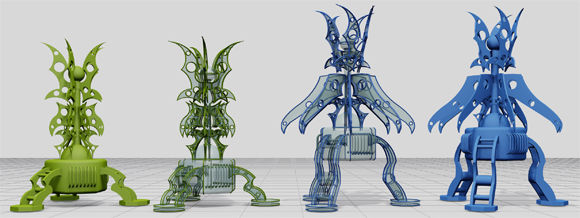- publication
- ACM SIGGRAPH 2009
- authors
- Ran Gal, Olga Sorkine-Hornung, Niloy Mitra, Daniel Cohen-Or

A complex model (left) consisting of 108 components is analyzed and 250 intelligent wires (in green) are extracted. Editing a few wires induces a new wire configuration (in blue) and leads to the result on the right.
abstract
Man-made objects are largely dominated by a few typical features that carry special characteristics and engineered meanings. Stateof- the-art deformation tools fall short at preserving such characteristic features and global structure. We introduce iWIRES, a novel approach based on the argument that man-made models can be distilled using a few special 1D wires and their mutual relations. We hypothesize that maintaining the properties of such a small number of wires allows preserving the defining characteristics of the entire object. We introduce an analyze-and-edit approach, where prior to editing, we perform a light-weight analysis of the input shape to extract a descriptive set of wires. Analyzing the individual and mutual properties of the wires, and augmenting them with geometric attributes makes them intelligent and ready to be manipulated. Editing the object by modifying the intelligent wires leads to a powerful editing framework that retains the original design intent and object characteristics. We show numerous results of manipulation of man-made shapes using our editing technique.
downloads
- Paper (ACM SIGGRAPH 2009, official version available at http://portal.acm.org/)
- BibTeX entry
- Accompanying video (with narration)
- Supplemental videos (editing sessions, no narration)
accompanying video (with narration)
supplemental videos
acknowledgments
We are grateful to Mario Botsch and Bob Sumner for helping us with Figure 6 in the paper. The models used in this paper were collected from the Princeton Shape Benchmark, AIM@SHAPE, and via personal communication with Hongbo Fu and Vladislav Kraevoy. We are indebted to Marc Alexa, Andrew Nealen, Denis Zorin and the anonymous reviewers for their valuable comments and suggestions. This work was supported in part by the Israeli Ministry of Science, the Israel Science Foundation, and by an ADVANCE Research Challenge Grant funded by the NSF ADVANCE-PAID award HRD-0820202. Niloy was supported by a Microsoft outstanding young faculty fellowship.